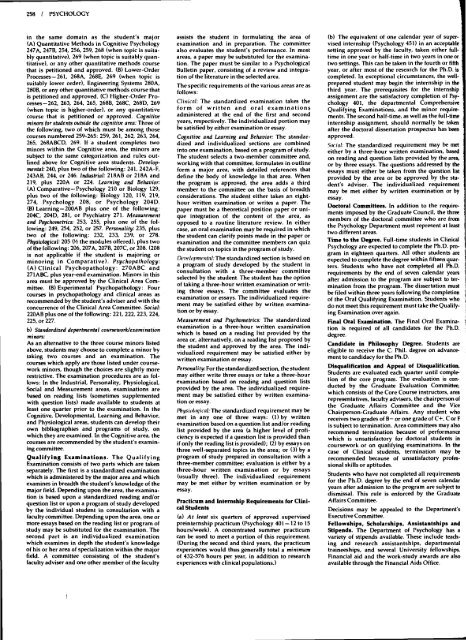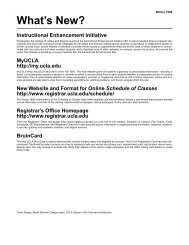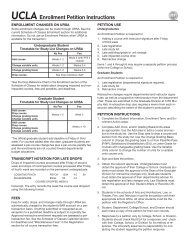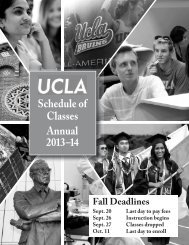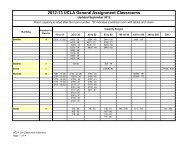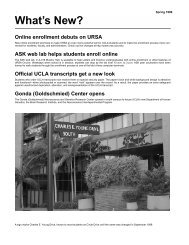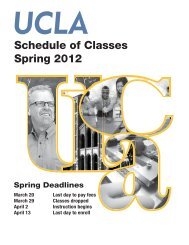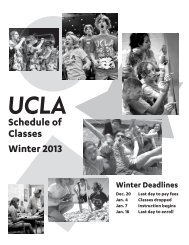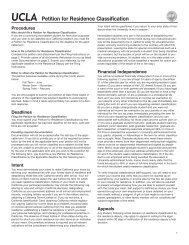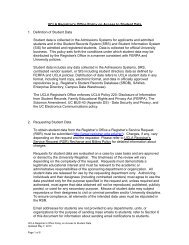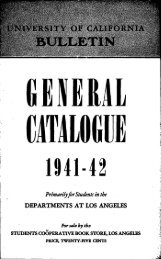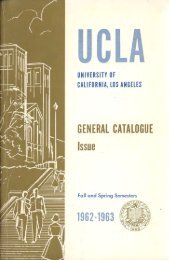UCLA Graduate Catalog 1980-81 - Registrar - UCLA
UCLA Graduate Catalog 1980-81 - Registrar - UCLA
UCLA Graduate Catalog 1980-81 - Registrar - UCLA
You also want an ePaper? Increase the reach of your titles
YUMPU automatically turns print PDFs into web optimized ePapers that Google loves.
258 1 PSYCHOLOGY<br />
in the same domain as the student's major assists the student in formulating the area of (b) The equivalent of one calendar year of super-<br />
(A) Quantitative Methods in Cognitive Psychology examination and in preparation . The committee vised internship (Psychology 451) in an acceptable<br />
247A, 247B, 254, 256, 259, 268 (when topic is suita- also evaluates the student 's performance . In most setting approved by the faculty, taken either fullbly<br />
quantitative), 269 (when topic is suitably quan- areas, a paper may be substituted for the examinatime in one year or half-time in two years in one or<br />
titative ), or any other quantitative methods course tion . The paper must be similar to a Psychological two settings. This can be taken in the fourth or fifth<br />
that is petitioned and approved . (B) Lower-Order Bulletin paper , consisting of a review and integra- year, or after most of the research for the Ph.D. is<br />
Processes - 261, 268A, 268E, 269 (when topic is tion of the literature in the selected area.<br />
completed . In exceptional circumstances , the well-<br />
suitably lower order ), Engineering Systems 280A,<br />
280B, or any other quantitative methods course that<br />
is petitioned and approved . (C) Higher -Order Processes-262,<br />
263, 264, 265, 2686, 268C, 268D, 269<br />
(when topic is higher -order ), or any quantitative<br />
course that is petitioned or approved. Cognitive<br />
minors for students outside the cognitive area: Three of<br />
the following , two of which must be among those<br />
The specific requirements of the various areas are as<br />
follows:<br />
Clinical: The standardized examination takes the<br />
form of written and oral examinations<br />
administered at the end of the first and second<br />
years, respectively . The individualized portion may<br />
be satisfied by either examination or essay.<br />
prepared student may begin the internship in the<br />
third year. The prerequisites for the internship<br />
assignment are the satisfactory completion of Psychology<br />
401, the departmental Comprehensive<br />
Qualifying Examinations, and the minor requirements<br />
. The second half-time, as well as the full-time<br />
internship assignment, should normally be taken<br />
after the doctoral dissertation prospectus has been<br />
courses numbered 259-265: 259, 261, 262, 263, 264,<br />
265, 268ABCD, 269. If a student completes two<br />
minors within the Cognitive area , the minors are<br />
subject to the same categorization and rules outlined<br />
above for Cognitive area students . Developmental:<br />
240, plus two of the following: 241, 242A-F,<br />
243AB, 244, or 246. Industrial: 218AB or 218A and<br />
219, plus 220A or 224. Learning and Behavior:<br />
(A) Comparative - Psychology 210 or Biology 129,<br />
plus two of the following: Biology 120, 119, 219,<br />
274, Psychology 208, or Psychology 204D.<br />
(B) Learning - 200AB plus one of the following:<br />
204C, 204D, 2<strong>81</strong>, or Psychiatry 271. Measurement<br />
and Psychometrics: 253, 255, plus one of the following:<br />
249, 254, 252, or 257. Personality: 235, plus<br />
two of the following: 232, 233, 239, or 278.<br />
Physiological: 205 (14 the modules offered ), plus two<br />
of the following: 206, 207 A, 2076, 207C, or 208. (208<br />
is not applicable if the student is majoring or<br />
minoring in Comparative ). Psychopathology:<br />
(A) Clinical Psychopathology : 270ABC and<br />
271ABC, plus year -end examination . Minors in this<br />
area must be approved by the Clinical Area Committee<br />
. (B) Experimental Psychopathology: Four<br />
courses in psychopathology and clinical areas as<br />
recommended by the student 's adviser and with the<br />
concurrence of the Clinical Area Committee . Social:<br />
220AB plus one of the following : 221, 222, 223, 224,<br />
Cognitive and Learning and Behavior: The standardized<br />
and individualized sections are combined<br />
into one examination , based on a program of study.<br />
The student selects a two-member committee and,<br />
working with that committee , formulates in outline<br />
form a major area, with detailed references that<br />
define the body of knowledge in that area. When<br />
the program is approved , the area adds a third<br />
member to the committee on the basis of breadth<br />
considerations . The student either takes an eighthour<br />
written examination or writes a paper. The<br />
paper must be a theoretical position paper or unique<br />
integration of the content of the area, as<br />
opposed to a routine literature review . In either<br />
case, an oral examination may be required in which<br />
the student can clarify points made in the paper or<br />
examination and the committee members can quiz<br />
the student on topics in the program of study.<br />
Developmental: The standardized section is based on<br />
a program of study developed by the student in<br />
consultation with a three -member committee<br />
selected by the student . The student has the option<br />
of taking a three-hour written examination or writing<br />
three essays. The committee evaluates the<br />
examination or essays . The individualized requirement<br />
may be satisfied either by written examination<br />
or by essay.<br />
approved.<br />
Social: The standardized requirement may be met<br />
either by a three-hour written examination, based<br />
on reading and question lists provided by the area,<br />
or by three essays. The questions addressed by the<br />
essays must either be taken from the question list<br />
provided by the area or be approved by the student<br />
's adviser . The individualized requirement<br />
may be met either by written examination or by<br />
essay.<br />
Doctoral Committees . In addition to the requirements<br />
imposed by the <strong>Graduate</strong> Council , the three<br />
members of the doctoral committee who are from<br />
the Psychology Department must represent at least<br />
two different areas.<br />
Time to the Degree . Full-time students in Clinical<br />
Psychology are expected to complete the Ph.D. program<br />
in eighteen quarters. All other students are<br />
expected to complete the degree within fifteen quarters.<br />
Students who have not completed all Ph.D.<br />
requirements by the end of seven calendar years<br />
after admission to the program are subject to termination<br />
from the program . The dissertation must J<br />
be filed within three years following the completion<br />
of the Oral Qualifying Examination . Students who<br />
do not meet this requirement must take the Qualifying<br />
Examination over again.<br />
225, or 227.<br />
b) Standardized departmental courseworklexami nation<br />
minors:<br />
As an alternative to the three course minors listed<br />
above, students may choose to complete a minor by<br />
taking two courses and an examination. The<br />
courses which apply are those listed under coursework<br />
minors, though the choices are slightly more<br />
restrictive . The examination procedures are as follows:<br />
In the Industrial , Personality, Physiological,<br />
Social and Measurement areas, examinations are<br />
based on reading lists (sometimes supplemented<br />
with question lists) made available to students at<br />
least one quarter prior to the examination. In the<br />
Cognitive , Developmental , Learning and Behavior,<br />
and Physiological areas, students can develop their<br />
own bibliographies and programs of study, on<br />
which they are examined . In the Cognitive area, the<br />
courses are recommended by the student 's examining<br />
committee.<br />
Qualifying Examinations . The Qualifying<br />
Examination consists of two parts which are taken<br />
separately . The first is a standardized examination<br />
which is administered by the major area and which<br />
examines in breadth the student 's knowledge of the<br />
major field . Depending upon the area , the examination<br />
is based upon a standardized reading and/or<br />
question list or upon a program of study developed<br />
by the individual student in consultation with a<br />
Measurement and Psychometrics: The standardized<br />
examination is a three-hour written examination<br />
which is based on a reading list provided by the<br />
area or, alternatively, on a reading list proposed by<br />
the student and approved by the area. The individualized<br />
requirement may be satisfied either by<br />
written examination or essay.<br />
Personality: For the standardized section, the student<br />
may either write three essays or take a three-hour<br />
examination based on reading and question lists<br />
provided by the area. The individualized requirement<br />
may be satisfied either by written examination<br />
or essay.<br />
Physiolgical: The standardized requirement may be<br />
met in any one of three ways: (1) by written<br />
examination based on a question list and/or reading<br />
list provided by the area (a higher level of proficiency<br />
is expected if a question list is provided than<br />
if only the reading list is provided); (2) by essays on<br />
three well-separated topics in the area; or (3) by a<br />
program of study prepared in consultation with a<br />
three -member committee ; evaluation is either by a<br />
three -hour written examination or by essays<br />
(usually three ). The individualized requirement<br />
may be met either by written examination or by<br />
essay.<br />
Practicum and Internship Requirements for Clinical<br />
Students<br />
Final Oral Examination. The Final Oral Examina- °<br />
tion is required of all candidates for the Ph.D.<br />
degree.<br />
Candidate in Philosophy Degree . Students are<br />
eligible to receive the C. Phil. degree on advancement<br />
to candidacy for the Ph.D.<br />
Disqualification and Appeal of Disqualification.<br />
Students are evaluated each quarter until completion<br />
of the core program. The evaluation is conducted<br />
by the <strong>Graduate</strong> Evaluation Committee,<br />
which consists of the Core Course instructors, area<br />
representatives, faculty advisers , the chairperson of<br />
the <strong>Graduate</strong> Affairs Committee and the Vice<br />
Chairperson -<strong>Graduate</strong> Affairs. Any student who<br />
receives two grades of B- or one grade of C+, C or F<br />
is subject to termination . Area committees may also<br />
recommend termination because of performance<br />
which is unsatisfactory for doctoral students in<br />
coursework or on qualifying examinations. In the<br />
case of Clinical students, termination may be<br />
recommended because of unsatisfactory professional<br />
skills or aptitudes.<br />
Students who have not completed all requirements<br />
for the Ph.D. degree by the end of seven calendar<br />
years after admission to the program are subject to<br />
dismissal . This rule is enforced by the <strong>Graduate</strong><br />
Affairs Committee.<br />
Decisions may be appealed to the Department's<br />
faculty committee . Depending upon the area, one or (a) At least six quarters of approved supervised Executive Committee.<br />
more essays based on the reading list or program of preinternship practicum (Psychology 401-12 to 15 Fellowships, Scholarships , Assistantships and<br />
study may be substituted for the examination. The hours/week). A concentrated summer practicum Stipends . The Department of Psychology has a<br />
second part is an individualized examination can be used to meet a portion of this requirement. variety of stipends available . These include teach-<br />
which examines in depth the student 's knowledge (During the second and third years, the practicum ing and research assistantships , departmental<br />
of his or her area of specialization within the major experiences would thus generally total a minimum traineeships, and several University fellowships.<br />
field. A committee consisting of the student's of 432-576 hours per year, in addition to research Financial aid and the work-study awards are also<br />
faculty adviser and one other member of the faculty experiences with clinical populations.)<br />
available through the Financial Aids Office.


